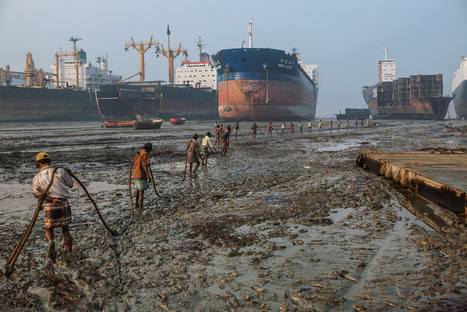In Bangladesh men desperate for work perform one of the world’s most dangerous jobs.
Get Started for FREE
Sign up with Facebook Sign up with X
I don't have a Facebook or a X account
 Your new post is loading... Your new post is loading...
 Your new post is loading... Your new post is loading...
|

Danielle Bellefeuille's curator insight,
May 10, 2014 6:16 PM
The sad reality of the new division of labor, we are moving backwards instead of forwards with labor policies and widening the gap between core and periphery countries. We need to stand up and advocate for fair trade. These countries rely on us for sources of unemployment, and we need to give them better wages, safer working conditions, and help them push pass this dependency, and grow into more economically and socially strong countries.
Michael Mazo's curator insight,
December 10, 2014 8:03 PM
The triangle shirtwaist factory in New York was a revolutionary turning point in labor regulations. Following this unfortunate event there had been many rules and laws that took effect in order to help the working people in factories and other harmful work places. The textile industry had been such an impact on globalization because this product had been so greatly treasured that countries all around the world were getting their fair share of producing a good that was in such high demand and through the use of globalization transport created an higher demand for textiles. Although, the boom of the textile industry came with the sacrifice of innocent civilians who worked endlessly just to feed their family. Regulations and legislation have to be put into effect to protect our people and our economy.
BrianCaldwell7's curator insight,
April 5, 2016 8:17 AM
One of the first industries to be impacted by what is today called globalization was the textile industry and the successive waves of globalization continue to alter the geography of the textile industry. This video shows how historical problems in the U.S. textile industry are seen today in countries such as Bangladesh, as does this interactive feature. The following paragraph is from a Geography News Network podcast / article that Julie Dixon and I co-authored for Maps101 about the Bangladeshi garment industry: Many developing countries with the majority of their laborers working in agriculture welcome outsourced labor from the West. This is seen as a way to nurture industrialization, even if it is on the terms of trans-national corporations. Countless workers seek employment in textile factories simply because low pay is still an entry into the cash economy and it is one of the few jobs rural migrants can find when they first enter the big city. In such locations, Western labor, construction, and environmental standards are not priorities because the population’s basic needs haven’t been met, so the responsibility falls to the global companies—but their aim is to cut costs as much as possible to remain competitive. From its emergence in textiles back in the late 1970’s, Bangladesh in 2013 made $19 billion in the export-oriented, ready-made garment industry, employing 4 million workers, most of whom are women. Listen to more of this Geography News Network podcast or read it here. Tags: Bangladesh, poverty, development, economic, globalization, industry, labor. |











Besides that scrap metal pollutes water and rivers, this is a health risk for humans too. I also know someone who worked at Electric Boat at the Air Base in North Kingstown who's health was also affected due to metal scraps and particles in the air. Years later after working at EB he developed lung cancer. Metal erodes away as well, especially when left sitting in salt water.
this is both amazing and horrifying in what these people do on a daily basis. i cannot imagine doing what these guys do everyday, and i never imagined how taking apart one of these ships would work.
What happens to massive cargo vessels after they are outdated? There are tons of scrap metal, but they aren't
designed to be taken apart. The ship-breakers of South Asia (Bangladesh, India and Pakistan are 3 of the 4 global leaders in recycling ships) risk much to mine this resource. This is an economic function that is a part of a globalized economy, but one than was never intended. There are major health risks to the workers and pollutants to the local community that are endemic in this industry that manages to survive on the scraps of the global economy.
Tags: Bangladesh, South Asia, poverty, development, economic, globalization, industry, labor.